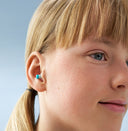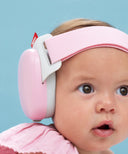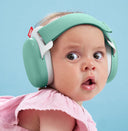One of the most common characteristics of children and adults with autism is hypersensitivity to sensory stimuli, such as sound. In this blog post, we'll briefly explain what autism is, shed light on the experiences of people with autism, and show how hearing protection can help manage sensory overload.
What is autism?
Autism is a neurological and developmental condition that has a profound impact on behaviour, development, communication and social interaction. Autism Spectrum Disorder (ASD) is an umbrella term that covers various forms of autism, including Asperger's and PDD-NOS. To clarify, autism is not a disease. It simply means that your brain functions differently from that of a neurotypical person.
What is life like for people with autism?
Autism is a spectrum disorder, meaning the symptoms and their intensity can vary significantly from person to person. Like everyone else, people with ASD have individual strengths and weaknesses. Almost everyone will be able to recognise one or more autistic traits in themselves. However, to receive a diagnosis of ASD, these traits must have a significant negative impact on daily life. Here are some of the key symptoms of ASD.
Challenges with social communication and interaction
People with Autism Spectrum Disorder have varying degrees of difficulty interpreting verbal and nonverbal language. For example, they might find it difficult to understand body language or the tone of someone's voice. Some people with autism are nonverbal, meaning they are unable to speak. Others might have very good verbal skills but take things too literally, struggle to identify and understand sarcasm or need more time to process verbal information. They may find it difficult to understand the feelings and intentions of others or to express their own feelings, which can make social interactions especially challenging.
Repetitive and/or restrictive behaviour
Life can feel very confusing and unpredictable when you have autism, so many people on the autistic spectrum rely on strict routines to create a sense of sameness and stability. This could be eating the same breakfast every day, always taking the same route to work or following a precise bedtime ritual. Anything that requires a change in routine, for example, moving home, changing school or going on holiday, can cause anxiety and stress. Even a seemingly small, one-off change, such as a bus being rerouted because of roadworks, can have a considerable impact. Some people with autism attach great importance to rules. Once they have learned to do something a certain way, it can be very difficult to adapt to a different way of doing it.
Intense or obsessive interests
Many people with ASD have intense, often very specific, interests from an early age. They derive great pleasure and satisfaction from exploring their favourite subjects and can seem to develop expert knowledge almost effortlessly. This focus can result in them doing very well academically, and many individuals with ASD have built successful careers thanks to their expertise. However, this level of focus on specific topics or activities can lead to other areas of life being neglected.
Hypersensitivity to sensory stimuli
Autism often causes heightened sensitivity to stimuli, such as light, touch, tastes, smells, colours, temperatures and sounds. For example, if you are hypersensitive to touch, you might prefer not to hug or shake hands. Others may misinterpret this, as it can create the impression that the person with ASD is distant or cold. However, it's important to set boundaries around what makes you feel uncomfortable! Another example of this hypersensitivity is music and other ambient noise in shops. Most people are able to ignore these or automatically filter them out, but they can be unbearably loud and distracting if you have autism. So it's no surprise that some people with autism try to avoid everyday situations because of this hypersensitivity. Places like school, work, supermarkets and restaurants can simply feel too overwhelming. This can cause anxiety or even physical pain. If it all becomes too much, the result can be meltdowns or shutdowns (emotional outbursts or withdrawal).
How can hearing protection benefit those with autism?
Both adults and children with autism often experience heightened sensitivity to sound. If this applies to you, using high-quality hearing protection can make a big difference. You can wear hearing protection in situations where ambient noise could quickly become overwhelming, for example, on public transport or a busy high street. Hearing protection reduces background noise, limiting the amount of auditory stimuli you receive. You're less likely to get overwhelmed as it gives you more mental 'space' to process other sensory stimuli.
What hearing protection is suitable for autism?
Here are our recommendations for the best hearing protection for those with autism:
- For focus and calm
The Alpine Silence earplugs are part of Alpine's range of hearing protection for concentration. These comfortable earplugs reduce ambient noise by up to 25 dB, making them perfect for studying or working. They're also ideal for travel or other situations where you might become overstimulated by noise.
- For reducing background noise while still being able to follow conversations
Alpine PartyPlug earplugs are designed to protect your hearing at concerts, festivals and parties without compromising sound quality. They have special filters that attenuate the music volume while still allowing you to communicate with your friends.
- For maximum noise reduction
Alpine SleepDeep earplugs were originally developed to ensure a good night's sleep. However, they have a high attenuation of 27 dB, making them ideal for other situations where you want to block out as much ambient noise as possible.
- For babies and children
Alpine hearing protection for babies and children offers a range of high-quality, comfortable hearing protection: Muffy Baby, Muffy Baby Classic and Muffy Kids. For children aged 3 to 12, we recommend Alpine Pluggies Kids earplugs.
As you can see, Alpine has a hearing protection solution to suit any age or situation. If you have any questions about our hearing protection products or need help to select the best hearing protection for autism, don't hesitate to contact us!



